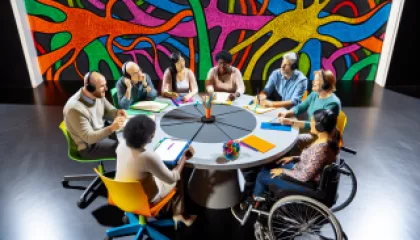Understanding Neurodiversity: Key Research Findings
Neurodiversity is a concept that has gained significant traction in recent years. It advocates for viewing neurological differences not as deficits, but as natural human variations. This perspective challenges the traditional pathologizing model and encourages acceptance and inclusion of individuals with neurological differences. This article delves into key research findings on neurodiversity, offering a comprehensive understanding of the subject.
Conceptualization of Neurodiversity
The term 'neurodiversity' was coined in the late 1990s as part of an online autism community. The concept was subsequently popularized by the Autism community, but it encompasses a wide range of neurological differences, including ADHD, dyslexia, Tourette’s syndrome, and others.(Armstrong, 2011). According to research, these neurological differences are the result of normal variations in the human genome.(Baron-Cohen, 2017)
Neurodiversity and Autism
The neurodiversity movement has had a profound influence on how Autism is perceived. Traditionally viewed as a disorder to be treated or cured, recent research supports the notion that Autism represents a different way of experiencing the world. (Silberman, 2015)
An important study by Kanner (1943) first described Autism as a distinct condition characterized by difficulties in social interactions and communication. However, cognition research has revealed that people with Autism often have unique skills and aptitudes, including pattern recognition, attention to detail, and the ability to think in systems, suggesting that Autism should be viewed not as a disorder, but as a different cognitive style.(Baron-Cohen, 2009)
Neurodiversity and ADHD
Attention Deficit Hyperactivity Disorder (ADHD) is another neurological difference that falls under the umbrella of neurodiversity. Traditionally, ADHD has been viewed as a deficit, but recent research suggests there are potential benefits associated with this condition.
A study by White and Shah (2006) found that individuals with ADHD displayed superior creative abilities compared to non-ADHD individuals. They were better at divergent thinking, originality and elaboration. Such findings challenge the deficit model of ADHD and suggest it could represent a different cognitive style that can confer advantages in certain contexts.
Neurodiversity and Dyslexia
Dyslexia, characterized by difficulties in reading and writing, is another condition included in the neurodiversity movement. Despite the challenges associated with dyslexia, research has identified several strengths commonly seen in individuals with this condition.
A study by Everatt et al. (1999) demonstrated that dyslexic individuals often excel in visual-spatial tasks. They are also more likely to be creative and innovative, and many successful entrepreneurs, artists, and inventors have been diagnosed with dyslexia. This highlights the need to shift away from a deficit-focused perspective towards recognizing the unique strengths and abilities associated with dyslexia.
The Neurodiversity Movement and Mental Health
The neurodiversity movement has also played a crucial role in redefining mental health. A study by DeYoung et al. (2010) suggests that mental health conditions like anxiety and depression may also be part of human neurodiversity. Rather than being solely pathological, these conditions might represent extreme manifestations of personality traits that can be advantageous in certain environments or situations.
Implications of Embracing Neurodiversity
Embracing neurodiversity has several implications, particularly in education and the workplace. It necessitates a shift from a deficit-focused model towards a strength-based approach that values and leverages the unique abilities associated with neurological differences.
A study by Armstrong (2012) demonstrated that when educators adopt a neurodiversity perspective, they are more likely to use inclusive teaching strategies that cater to diverse learning styles, thereby enhancing learning outcomes for all students.
In the workplace, companies like Microsoft and SAP have launched neurodiversity programs aimed at harnessing the unique skills of neurodiverse individuals. These initiatives have been shown to foster innovation, improve problem-solving capabilities, and enhance team performance.(Austin, 2020)
Conclusion
The neurodiversity movement, backed by growing research evidence, advocates for a paradigm shift in how we perceive neurological differences. Instead of viewing these differences as deficits to be corrected, neurodiversity encourages us to recognize and appreciate them as natural variations in the human genome. This perspective not only promotes acceptance and inclusion but also allows us to leverage the unique strengths associated with these conditions, leading to improved outcomes in education and the workplace.






